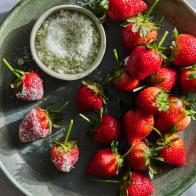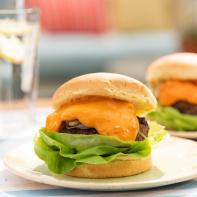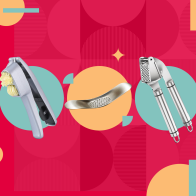Should You Stop Eating Kale?
Or making eggs? Or drinking hot tea? Last week was a rough one for food news, folks.

DronG/Getty
If you’ve been scrolling through the headlines in nutrition the past week you're probably wondering if anything is safe to eat or drink anymore. The truth is, most of the news is not quite as dire as it sounds. Here is the rundown from a registered dietitian of what to worry about and some tips to help you make sense of all the hoopla.
Strawberries, Kale and Pesticides
The Environmental Working Group just released the newest version of the Shopper’s Guide to Pesticides in Produce and hit lists, the Dirty Dozen and Clean Fifteen. These lists rank the detectible amount of pesticide residues found on the edible portions of popular produce items. The undertone of this publication is to keep consumers informed about where pesticides are found and offer up organically grown (and, in many instances, more expensive) produce in its place. Conventionally grown strawberries topped this year’s list, but the reappearance of kale at number three (it’s been off the list for about a decade) is what’s getting a lot of buzz. The Dirty Dozen list has been convoluted into a message that “dirty” produce should be avoided and that’s a little too alarmist for my liking — especially when you consider that even the amounts of residue in kale and the other fruits and veggies on the list are still considered totally safe. How much kale would you have to eat to be affected? Likely more than you would ever even consider — admit you don’t eat that much kale. Based on this pesticide calculator, a woman would need to consume 18,615 servings of kale to be even at the slightest risk. For strawberries, it’s 454 servings. At this point, 90% of Americans don’t even meet the recommended daily serving (about a handful each) of vegetables.
Bottom Line: The existence of residues doesn’t automatically make a food off-limits, and the benefits of eating fruits and vegetables far outweigh the potential harm from the produce on this top 12 list. Use the Dirty Dozen as a part of your decision-making process, not an all-out do and don’t list for the produce you purchase.

3283197d_273/Getty
Eggs and Heart Heath
An article published in the Journal of the American Medical Association is making a ruckus in the media after sharing findings that eating eggs was to blame for an increased risk in cardiovascular disease. But wait, weren’t eggs vindicated? Now we shouldn’t eat them again? No wonder you’re confused. The problem is, this study was observational, meaning it doesn’t show cause and effect. Subjects were only asked about their diets one time, a snapshot. Can you sum up your lifetime of eating in one shot? So, it’s very possible other lifestyle and dietary habits may have been to blame. Last time I checked, someone should pay attention if you eat your eggs with a pound of fatty meat while toking on a cigarette. If you suffer from heart disease or have high cholesterol, working with your physician and a registered dietitian may be the best way to decide how your diet should look.
Bottom Line: Don’t give up on eggs just yet! Keep cracking for a dose of high quality protein, vitamins and antioxidants as part of a balanced diet.

Alexthq/Getty
Hot Tea and Esophageal Cancer
A study published in the International Journal of Cancer determines that plentiful amounts of hot tea may be associated with a sharp increased risk of esophageal cancer — up to 90%.
Further research is needed to determine why this increased risk occurs, but researchers suggest waiting for tea to cool below 60 degrees C (140 degrees F) before drinking can decrease your risk.
Bottom Line: Seems like an easy enough thing to do in the name of throat health, no? Keep the cover off that travel mug for an extra few minutes and let your hot bevvie of choice chill out a bit before you sip.
Related Links:


























